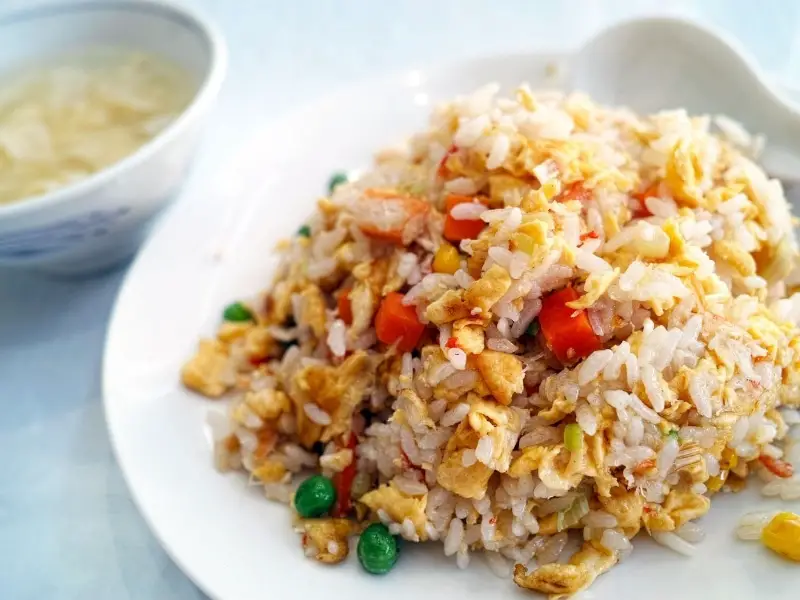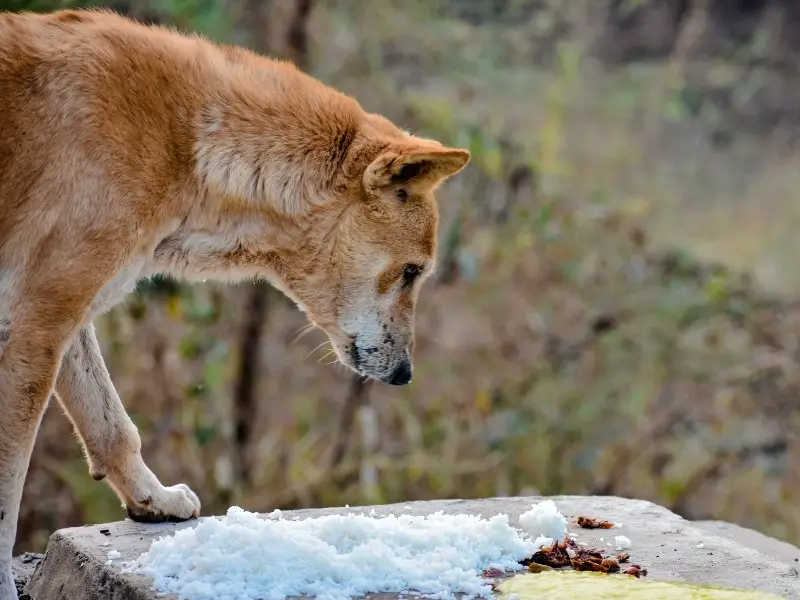Rice is one of the most popular cereal grains and a staple food in many parts of the world. If you like eating white rice or use it often in recipes, you are probably wondering whether it’s safe to share some rice with your dog.
So, can dogs eat rice? Yes, boiled white rice is safe for dogs to eat. In fact, most veterinarians advise feeding your dog small portions of plain white rice to soothe an upset stomach. A common ingredient in commercial dog foods, white rice is easy to digest carbohydrate that’s low in fiber and quick to prepare.
In this article, we’ll cover all the benefits and downsides of feeding rice to your dog. Keep on reading to find out if rice is good for dogs!
Is Rice Good for Dogs?
White and brown rice is completely safe for dogs to eat. In fact, rice is a common ingredient in many commercial dog foods.
Furthermore, vets often prescribe a bland diet of white rice for dogs suffering from gastrointestinal problems. White rice is high in starch, very easy to digest, and helps bind the stool in cases of diarrhea and stomach upset.
Although dogs can eat both brown and white rice, it’s worth noting that brown rice is never given to dogs with digestive issues. It’s always a small amount of white rice that is used to relieve symptoms of gastrointestinal problems in dogs.
Benefits of Rice for Dogs

Dogs can experience many health benefits while eating white rice as a part of a balanced diet. If you decide to feed rice make sure that it’s plain and prepared without salt, seasoning, oil, or butter.
The biggest benefits of white rice for dogs are:
1. Rice Boosts Energy
White rice is a great source of carbs with around 53 grams of carbohydrates per serving. Most of it is starch, and only a small amount of that carb is fiber and sugar.
Although dogs thrive on a high protein diet, they also use carbs to stay energized throughout the day (source).
2. White Rice Supports Digestive System
Adding white rice to your dog’s diet can do wonders for their digestive system and help regulate their bowel movements. If your dog experiences gastrointestinal problems such as vomiting or diarrhea, a bland white rice diet can help soothe its digestive system.
Even if your dog doesn’t have stomach problems, eating boiled white rice occasionally can improve their digestion and the quality of their stool.
3. Rice Builds Muscles
Although a cereal grain, white rice is a good source of protein that helps build lean and strong muscles. With around four grams of protein per serving cup, white rice can help keep your dog energized throughout the day and also be a valuable source of plant-based protein.
Risks of Feeding Rice to Dogs

While plain, boiled white rice can be a great diet for dogs with digestive issues, your dog shouldn’t eat rice all the time. When it comes to rice and dogs, there are certain downsides you should know about before you decide to make white rice a regular part of your pup’s diet.
The biggest side effect of feeding white rice to dogs are:
1. Spike in Blood Sugar Levels
Although easy to digest, white rice is full of starch and has a higher glycemic index than brown rice. Preparing rice for your dog and feeding it to them regularly can cause blood sugar levels to rise which can be dangerous if your dog has diabetes.
Even if your pooch is completely healthy, eating white rice every day can have adverse effects on their overall health and might even result in diabetes.
2. Obesity
Besides protein and fat, carbohydrates play an important part in your dog’s diet and are the main energy source. However, eating a lot of carbs can result in weight gain and lead to obesity in dogs.
Since commercial dog foods already contain appropriate amounts of carbs, make sure that you aren’t stuffing your pooch with carb-rich foods such as rice. Your dog can easily pack on the pounds thanks to those extra carbs and calories from rice.
Unfortunately, obesity is a big problem for many dogs and their owners and it can lead to diabetes, heart disease, and joint problems (source). If you want to add rice to your dog’s diet, be careful not to overfeed and keep an eye on your dog’s weight.
How Much Rice Can I Give My Dog?
While white rice is completely safe for dogs to eat, always consult your vet before making any changes to your dog’s diet. If your veterinarian says your dog can benefit from eating rice they will also tell you how much rice your dog should eat.
Like all other human foods, white rice or other treats shouldn’t make more than 10 percent of your dog’s daily calorie intake (source). If your dog doesn’t suffer from digestive problems feed them rice two to three times a week at the most, in addition to their regular diet.
How to Feed Rice to Your Dog?
If you decide to include rice in your dog’s diet, choose white instead of brown rice. Do this because white rice is more processed than brown rice, and as such, much easier for your dog to digest.
When preparing rice for your dog, keep it plain and simply boil it in water without adding salt, seasoning, oil, butter, or spices.
Popular ways to feed rice to your dogs are:
- Feed plain boiled rice to your dog
- Mix a tablespoon of rice with your dog’s food
- Boil white rice and chicken breast
- Make a homemade dog meal using rice, chicken meat, and veggies
Conclusion
Plain, boiled white rice is safe for dogs to eat and is often recommended by vets for dogs with digestive problems. High in starch but low in fiber, white rice is easy to digest and helps bind the stool in case your dog is having diarrhea.
Please remember, white rice is high in carbs which can cause weight gain, obesity, and other health problems. If you decide to feed rice to your dog, cook it in water and feed it plain to your dog no more than three times a week.
Related Articles:


0 Comments